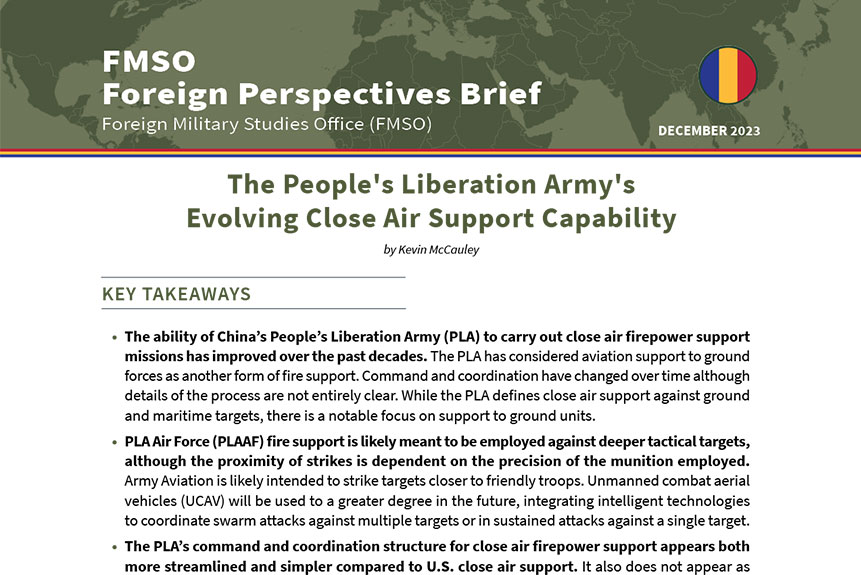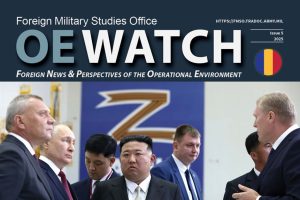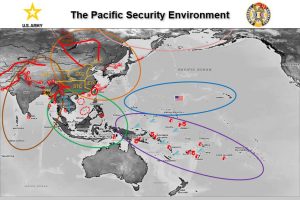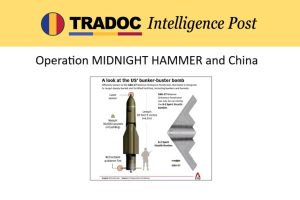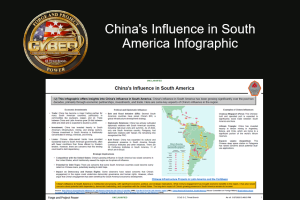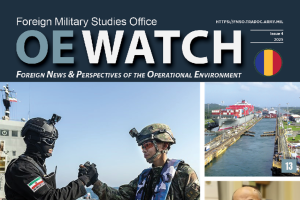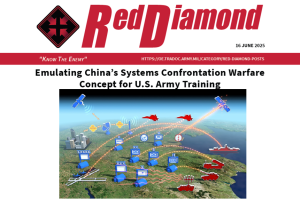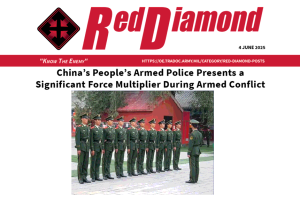The People’s Liberation Army’s Evolving Close Air Support Capability
By Kevin McCauley
Distribution A: Approved for public release
File Size:
2.4MB
File Type:
Page Count:
31
Share & Get The Message Out
- The ability of China’s People’s Liberation Army (PLA) to carry out close air firepower support
missions has improved over the past decades. The PLA has considered aviation support to ground
forces as another form of fire support. Command and coordination have changed over time although
details of the process are not entirely clear. While the PLA defines close air support against ground
and maritime targets, there is a notable focus on support to ground units. - PLA Air Force (PLAAF) fire support is likely meant to be employed against deeper tactical targets,
although the proximity of strikes is dependent on the precision of the munition employed.
Army Aviation is likely intended to strike targets closer to friendly troops. Unmanned combat aerial
vehicles (UCAV) will be used to a greater degree in the future, integrating intelligent technologies
to coordinate swarm attacks against multiple targets or in sustained attacks against a single target. - The PLA’s command and coordination structure for close air firepower support appears both
more streamlined and simpler compared to U.S. close air support. It also does not appear as
integrated with ground maneuver. The PLA is capable of air-to-ground precision strikes directly
supporting ground force’s tactical combat but likely faces challenges in fully integrating these
capabilities into a complex maneuver operation. - PLAAF modernization is fielding increasingly advanced reconnaissance and targeting systems.
The PLA’s emphasis on precision munitions improves the capability to strike targets closer to friendly
troops and closely integrate fires with maneuver. Improved close air firepower support would
significantly enhance ground combat and maneuver warfare. Improvements to China’s domestic
chip-building capability and the development of a capable and redundant Beidou global navigation
satellite system (GNSS) likely will support this effort. - Recent research sponsored by China increasingly is influenced by U.S. close air support
(CAS) theory and practice. PLA-affiliated scholars are closely studying the U. S. CAS process,
communications, coordination, and weapons systems. While it is unlikely the PLA will copy U.S.
procedures and organizations completely, it will likely adopt features it believes will improve its
aerial fire support capabilities
Related Products
The Army’s Training Environment Enabling Indo-Pacific Integrated Deterrence
Check out TRADOC G-2's contribution to Military Review, The Army's...
U.S. Adversaries’ Trilateral Naval Exercises Reflect Convenience, Not Convergence
This paper is the first in a new series that...
The Pacific Security Environment
TRADOC G-2 briefing on the "The Pacific Security Environment" presented...
China’s Influence in South America Infographic
This infographic offers insights into China's influence in South America....
Emulating China’s Systems Confrontation Warfare Concept for U.S. Army Training
After observing the U.S. military’s performance in the first Gulf...
China’s Escalating Gray Zone Campaign
In 2024, China’s gray zone activities significantly escalated across the...
China’s People’s Armed Police Presents a Significant Force Multiplier During Armed Conflict
Since 2018, China has transformed the People’s Armed Police (PAP)...


